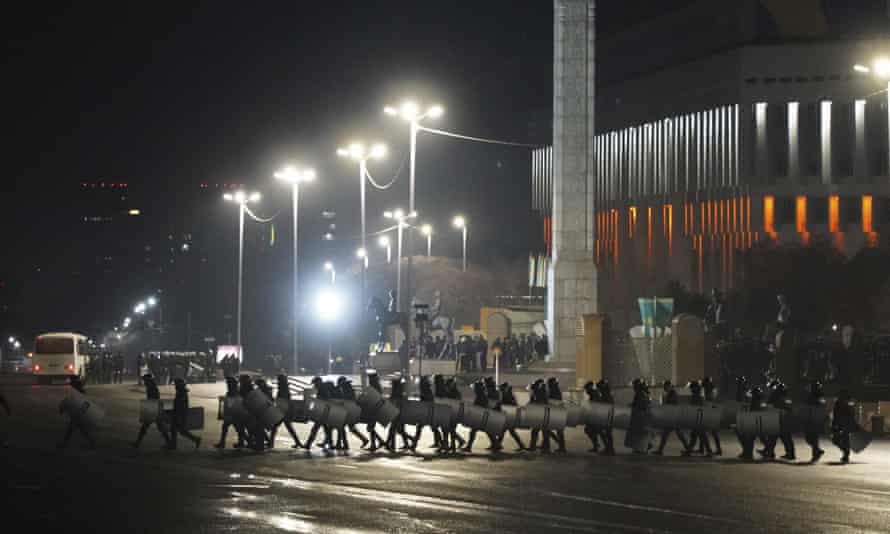Kazakhstan’s president has declared a state of emergency in much of the country as authorities struggled to respond to a rare outbreak of unrest.
Fueled by rising fuel prices, the protests began in the west of the country over the weekend and have spread rapidly.
Video footage from Almaty, Kazakhstan’s largest city, showed lines of riot police and numerous crowd control vehicles crowded into the city center Tuesday night.
Police used stun grenades and tear gas after crowds refused to disperse, AFP reported, estimating more than 5,000 people were present. Later, there were unverified reports of burning police cars in Almaty, and videos emerged from several other cities showing protesters braving freezing temperatures and a large security force presence.
Mobile internet is down and messaging apps are blocked in much of the authoritarian Central Asian nation.
“All calls to raid or attack government buildings are absolutely illegal,” President Kassym-Jomart Tokayev said in a video address Tuesday night.
In a tweet, Tokayev blamed the protests about “destructive individuals who want to undermine the stability and unity of our society.” However, in an attempt to quell the unrest, he said the government would meet on Wednesday to discuss “the socio-economic demands” of the protesters.
Late on Wednesday, he imposed a state of emergency covering Almaty and western Mangystau province, which should last two weeks.
The protests began over the weekend in the oil city of Zhanaozen, the same place where, in December 2011, police fired on protesters, killing at least 16 people.
The initial spark of outrage was the sharp rise in the price of liquefied petroleum gas (LPG), used by many to power their cars, particularly in western Kazakhstan. The price doubled in a matter of days.

Tokayev said the government would introduce a maximum price of 50 tenge (about 8 pence) per liter of LPG, about half the current market price, in Mangystau province.
However, the protests have taken on a more political tone in some places, with a release of pent-up frustration at the government’s lack of accountability in the authoritarian country.
Tokayev is the handpicked successor to Nursultan Nazarbayev, a Soviet-era communist chieftain who became Kazakhstan’s first leader after independence and ruled for nearly three decades until he resigned in 2019. The 81-year-old is still in office. enormous power behind the scenes, and the country’s capital was renamed the Nur-Sultan in his honor in 2019.
Under Nazarbayev and his successor, a small elite have accumulated enormous wealth, while life for many ordinary Kazakhs remains harsh, especially in the resource-rich west of the country. Rare protests have been ruthlessly crushed and the regime faces no real opposition in parliament.
www.theguardian.com
George is Digismak’s reported cum editor with 13 years of experience in Journalism